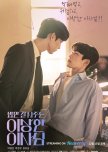
I dig it
In this captivating film, Win Metawin's performance is a revelation, showcasing a depth of emotion that I had not previously seen from him. His portrayal is both raw and nuanced, drawing the audience into the character's inner turmoil with remarkable skill.One of the most impressive aspects of the film is the seamless way in which both Janella and Win switch between languages. From English to Thai, Filipino, and even some Cantonese, their linguistic dexterity adds a layer of authenticity to their characters, making them feel all the more real and relatable.
Moreover, the film offers a fresh perspective on Hong Kong, showcasing lesser-known spots that highlight the city's unique charm and beauty. As someone who thought they knew Hong Kong well, I was pleasantly surprised by the new discoveries the film had to offer.
The dialogue in the film is another standout element, with well-crafted lines that are both metaphoric and deeply reflective. These moments of contemplation add a profound depth to the film, elevating it beyond a mere narrative and into the realm of existential exploration.
Overall, this film is a triumph on multiple levels. From Win Metawin's captivating performance to the film's rich tapestry of languages and its thoughtful dialogue, every aspect of the film comes together to create a truly unforgettable cinematic experience.
Cet avis était-il utile?

Cette critique peut contenir des spoilers
A BL That Writes Its Own Rules
"Lovely Writer" is not your typical Thai BL series—it's a standout production that boldly calls out the industry's flaws while delivering a heartfelt and compelling love story. Directed by Tee Bundit Sintanaparadee and adapted from Wankling's novel Nap Sip Ja Jup, this 12-episode series aired on Channel 3 in Thailand and WeTV, leaving an indelible mark on fans worldwide.The series stars Up Poompat Iam-Samang as Gene, a shy novelist pushed to write BL fiction, and Kao Noppakao Dechaphatthanakun as Nubsib, the charming actor who transforms Gene’s life. From the moment their paths cross, Lovely Writer offers a layered narrative that balances romance, industry critique, and humor, with plenty of delightful surprises along the way.
What Stands Out
The series dares to address issues often ignored in BL dramas—consent, toxic fan behaviour, and the challenges actors face in navigating public and private lives. The chemistry between Gene and Nubsib is refreshingly consensual, making their romantic moments feel natural and deeply satisfying. Episode 9, in particular, offers an intimate scene that’s both tasteful and electric, a highlight for fans of slow-burn storytelling.
The characters are well-developed, each with distinct personalities that contribute to the narrative. Even the antagonists have depth, making them more than mere plot devices. The series also cleverly critiques the BL industry's fetishisation of actors' relationships, showing the human side of performers while taking playful jabs at industry clichés.
The Hits and Misses
While the main storyline is captivating, the subplot involving Aoey and Mhok feels incomplete, leaving some loose ends that could have been tied up better. The reveal that Gene and Nubsib knew each other as children adds a layer of complexity but comes off as slightly contrived. And the multiple endings? A bold move, but it left viewers scratching their heads rather than cheering.
Still, the series’ willingness to experiment is admirable. The finale’s meta twist—revealing the series as an adaptation of Gene and Nubsib’s story—may have been polarising, but it emphasises the creative risks Lovely Writer is willing to take.
Why It’s Worth Watching
Beyond its engaging romance, Lovely Writer challenges viewers to rethink the BL genre's norms. It showcases a healthy relationship dynamic while exploring the pressures of fame and societal expectations. As viewer, I appreciate its global relevance, particularly its commentary on the importance of family support for LGBTQ+ individuals—a theme that resonates universally.
For fans seeking a BL series that’s heartfelt, thought-provoking, and beautifully produced, Lovely Writer is a must-watch. Despite its imperfections, it raises the bar for the genre and leaves a lasting impression. Whether you're here for the romance, the critique, or both, this series delivers on multiple fronts.
Verdict: A groundbreaking, must-watch BL that beautifully blends romance, industry critique, and humour—flaws and all.
Cet avis était-il utile?

Cette critique peut contenir des spoilers
Green Bones: A Tale of Justice, Redemption, and the Grey in Between
"Green Bones: A Tale of Justice, Redemption, and the Grey in Between"Green Bones is a cinematic gem that should be on everyone’s must-watch list this year. Directed by Zig Dulay and written by Ricky Lee and Anj Atienza, based on a concept by JC Rubio, this 2024 Philippine prison drama challenges audiences to rethink their notions of morality, justice, and redemption. Featuring standout performances by Dennis Trillo and Ruru Madrid, the film premiered on December 25, 2024, as part of the 50th Metro Manila Film Festival, and has already left audiences buzzing.
The story hinges on a powerful concept: green bones, found in a person’s cremated remains, symbolize a life of goodness—something remorseless criminals could never possess. Against this intriguing backdrop, the narrative unfolds with Xavier Gonzaga (Ruru Madrid), a grief-stricken corrections officer determined to prevent the release of Domingo Zamora (Dennis Trillo), a man convicted of the gruesome murder of his sister and niece. As Xavier wrestles with his bias, the film peels back the layers of Zamora’s story, challenging assumptions and delving into the grey areas of human nature.
A Philosophical and Emotional Journey
From the first scene, Green Bones grabs your attention with its philosophical depth and unflinching exploration of morality. Dulay’s direction turns what could have been a typical prison drama into a dark, fairy-tale-like meditation on justice. The screenplay is taut, with precise pacing that keeps the runtime feeling concise yet impactful. Ricky Lee and Anj Atienza's writing deftly balances drama and introspection, offering a narrative that’s both deeply human and profoundly thought-provoking.
The film’s philosophical approach is where it truly shines. It dismantles binary notions of good and evil, reminding us that human beings are capable of both. The narrative underscores that our choices—and how we take responsibility for them—define our morality. Moreover, it critiques systemic injustices that often label individuals as entirely good or bad, urging viewers to look deeper.
A Visual and Performative Triumph
Neil Daza’s cinematography deserves special mention, with sweeping aerial shots juxtaposed against intimate close-ups that reveal the characters’ inner turmoil. The prison, reminiscent of the real-life Iwahig Penal Colony in Palawan, serves as a visual metaphor for the film’s themes: a place of confinement that also offers the possibility of growth and redemption.
Dennis Trillo delivers a career-defining performance as Zamora, transitioning seamlessly between menace and vulnerability. His portrayal is a masterclass in nuanced acting, anchoring the film with emotional depth. Ruru Madrid complements him perfectly, bringing raw intensity to Gonzaga’s internal struggle. Together, they create a dynamic that is both heartbreaking and cathartic. The supporting cast, including Alessandra de Rossi, Iza Calzado, and Ronnie Lazaro, enrich the film’s tapestry, each bringing their A-game to their respective roles.
Themes That Resonate
Green Bones is not just about individual redemption; it’s a commentary on societal systems. Through its characters and their stories, the film highlights how systemic injustices affect everyone involved—victims, perpetrators, and enforcers alike. It challenges the audience to question their own prejudices and to recognize the humanity in those society often deems irredeemable.
The film also touches on themes of hope and transformation. The symbolic tree where characters tie their wishes mirrors Buddhist prayer flags, reinforcing the idea that goodness can prevail even in the darkest of places.
A Final Word
Green Bones is a cinematic triumph that transcends its genre. It’s a deeply moving exploration of justice and redemption, brought to life by stellar performances and masterful storytelling. Dulay’s direction, combined with Lee and Atienza’s writing, ensures that the film not only entertains but also provokes meaningful reflection.
By the time the credits roll, you’ll find yourself grappling with questions about morality, forgiveness, and the human capacity for change. And perhaps, like many others, you might leave the theater with a few tears shed and a heart full of empathy.
Green Bones is more than just a movie—it’s an experience, a conversation starter, and, ultimately, a call to look beyond the surface and into the soul of what makes us human.
Cet avis était-il utile?

DON'T WATCH THIS IF YOU'RE ALONE AT NIGHT
This series got me screaming!!!I did not expect it to scare me. It's quite intruiging.
The storyline is not predictable and though the premise has been established on the onset, the plot will still unravel in the most unexpected twist.
In terms of acting I always have a high expectation with Gun and I know he delivers. This is also my first time watching Tor and he played his character really well.
If you are a fan of GMMTV artists, this series is quite star-studded and every week you can expect a special guest.
Cet avis était-il utile?

Cette critique peut contenir des spoilers
First Note of Love: A Sweet Tune to the Heart
First Note of Love is a 12-episode Taiwanese Yaoi series directed by Shiue Bin Jian, streaming on Gagaoolala from August to October 2024. It follows Neil (Charles Tu), a famous guitarist and singer, and Sea (Michael Chang), a prodigy composer and closet fan. The story blends first love, healing, and dreams as the two form a deep connection through music.Six years after Neil’s brother and bandmate Matt passed away, Neil is still coping, grappling with anxiety and stage fright. Sea, a talented yet inexperienced composer, is invited by Neil’s manager to collaborate with his idol. Sea’s earnest love for music begins to chip away at Neil’s walls, promising a heartwarming tale of growth and mutual healing.
The series has already delivered touching moments and showcases a love for music that feels genuine. Neil and Sea’s relationship starts off rocky, with Neil viewing Sea as unworthy. But, their growth promises to be satisfying as they move from reluctant partners to a harmonious duo, both in music and in love.
The supporting characters, particularly Sea’s cheeky friend Liang, and Neil's colleague Mei add a fun dimension, and the unexpected subversion of character types keeps things fresh. With Neil and Sea’s strong past connection and shared musical passion, their romance is gentle yet impactful—a slow-burn love story focused on understanding and emotional connection.
The production quality is solid, with strong cinematography (though some time jumps could be clearer), and the music is beautifully integrated, enhancing the narrative and character depth. The actors bring maturity to their roles, which is refreshing for a BL series, and the language barrier with Orca, a Thai character, is handled realistically.
First Note of Love strikes a lovely balance between love and music. The original soundtrack stands out, with lyrics that mirror the characters' struggles and dreams, amplifying the emotional stakes. With its touching themes and addictive storyline, this series is a warm, soulful watch that will resonate with viewers on many levels.
Cet avis était-il utile?

Cette critique peut contenir des spoilers
My Love Mix-Up Thailand - A Mixed Bag of Expectations
GMMTV’s adaptation of Kieta Hatsukoi—a Japanese Yaoi manga by Hinekure Wataru—is a curious endeavor. The original series, which was also adapted into a Japanese BL drama in 2021, brought a fresh and charming story to life. So, when I heard GMMTV was creating a Thai version, I’ll admit I had my reservations. The Japanese series had its quirks, and I wondered how this would translate into the world of Thai BL. As a fan of both the manga and the original show, I went in with cautious optimism.The premise of My Love Mix-Up! Thailand remains true to its source material. We have Atom, played by Fourth Nattawat, who is a timid and somewhat clumsy high schooler with a crush on his classmate Mudmee (Pahn Pathitta). His world is turned upside down when a simple mix-up leads Kongthap (Gemini Norawit) to believe Atom has a crush on him, setting off a series of misunderstandings and comedic moments.
Right from the start, the series felt like it was missing something. There’s a certain magic in storytelling that pulls you in, makes you root for the characters, and keeps you invested. Unfortunately, My Love Mix-Up! Thailand struggled to find its footing. For a series with such a light-hearted and fun premise, it often felt like it was dragging its feet.
Fourth Nattawat’s portrayal of Atom was lackluster at best. He’s a talented actor, and I’ve seen him shine in other roles, but here it felt like he was holding back. Perhaps it was the character itself or maybe the direction, but whatever it was, it didn’t quite hit the mark. Gemini Norawit as Kongthap had moments of brilliance, particularly in scenes where his stoicism came into play, but overall, it felt like both actors were coasting rather than fully embodying their roles.
One of the biggest downfalls of the series is the excessive product placement. Now, I understand that sponsorship is a necessary evil in today’s media landscape, but there’s a fine line between subtle integration and blatant advertising. Unfortunately, My Love Mix-Up! Thailand crossed that line repeatedly. The product placements were so jarring that they often pulled me out of the story entirely. It’s a real shame because it distracted from the chemistry that could have developed between the characters.
Speaking of chemistry, Gemini and Fourth have it in spades. We’ve seen it before in Moonlight Chicken and My School President, where their interactions felt natural and heartfelt. However, in My Love Mix-Up! Thailand, that chemistry was left to languish in the background. There were a few standout moments—Kongthap and Atom bonding over their parents’ relationships, Atom sharing his dream of opening a café—but these were few and far between. The series never fully allowed their relationship to flourish, instead opting for contrived conflicts and rushed resolutions.
The romance arc, which should have been the heart of the show, felt forced and unconvincing. Atom’s crush on Mudmee is brushed aside almost immediately, leaving little room for emotional depth. The transition from friendship to romance between Atom and Kongthap lacked the gradual build-up that makes these stories compelling. By the time they became a couple, it felt more like a box had been ticked than a natural progression of their relationship.
Another issue was the pacing. The show tried to cram too much into too little time, resulting in rushed story arcs and unsatisfying conclusions. This is especially evident in Atom’s struggle with his sexuality and his eventual decision to pursue his dream of becoming a chef. Both of these storylines could have been explored in greater depth, but instead, they were wrapped up in a matter of minutes.
Now, it’s not all bad. There were some genuine moments of charm, particularly in the way the series handled the friendship between Atom and Mudmee. Their dynamic was one of the few bright spots in an otherwise uneven show. Additionally, the soundtrack was a highlight—catchy and well-suited to the tone of the series, even if it was a bit overused.
In the end, My Love Mix-Up! Thailand feels like a missed opportunity. With the talent of Gemini and Fourth at their disposal, GMMTV could have created something truly special. Instead, we’re left with a series that, while not without its merits, falls short of the standard set by other Thai BL dramas. For fans of the original manga or the Japanese series, this adaptation might be a bit of a letdown.
As much as it pains me to say it, I can’t rate this any higher than a 5 out of 10. It’s a middling effort that doesn’t quite capture the heart or humor of its source material. Here’s hoping GMMTV takes this as a learning experience and gives these talented actors the scripts they deserve in future projects.
Cet avis était-il utile?

Masterpiece
"Last Twilight" is a series that exceeded my expectations and left a lasting impact on me. With a compelling storyline and powerful performances from the cast, it's a masterpiece that showcases the magic of acceptance and the beauty of love.From the start, I had high hopes for this series, knowing that Jimmy and Sea, along with the legendary Director P'Aof, would deliver something truly special. And they did not disappoint. Each episode was emotionally charged, and I found myself fully immersed in the story, preparing myself for a heartbreaking ending.
What sets "Last Twilight" apart is its portrayal of people with disabilities as ordinary individuals capable of experiencing love and life just like anyone else. It teaches us to treat everyone with respect and understanding, showing that true beauty lies in how we perceive the world around us.
The series also offers valuable lessons about facing challenges and never giving up. Day's journey of acceptance and living life to the fullest, despite his condition, is both inspiring and heartwarming. His relationship with Mhok is a testament to the power of love and how it can overcome any obstacle.
"Last Twilight" is not just a love story; it's a celebration of life and the human spirit. It reminds us that as long as we have someone by our side to love and live for, we can conquer anything that comes our way. This series has touched my heart in ways I can't fully describe, and I am grateful to have experienced its beauty and depth.
In conclusion, "Last Twilight" is a true masterpiece that has left a profound impact on me. It's a series that will stay with me for a long time, and I highly recommend it to anyone looking for a meaningful and moving story.
Cet avis était-il utile?

The Paradise of Thorns
0 personnes ont trouvé cette critique utile
Cette critique peut contenir des spoilers
The Paradise of Thorns: A Poignant Thai Drama That Cuts Deep
Released in 2024, The Paradise of Thorns marks Naruebet Kuno’s impressive directorial debut. Starring Jeff Satur and Engfa Waraha, this Thai romantic drama premiered theatrically in Thailand before making its international debut at the Toronto International Film Festival. Now available for streaming in select regions on Netflix, the film delivers a stirring narrative of love, loss, and resilience.The story revolves around Thongkam (Jeff Satur) and Sek (Pongsakorn Mettarikanon), a same-sex couple who pour their hearts into building a durian orchard together in rural Thailand. Their idyllic life is shattered when Sek tragically passes away, leaving Thongkam to face the harsh reality of Thai laws that fail to recognize same-sex unions. Stripped of his rights, Thongkam must fight to reclaim the home and orchard he helped create, which are legally handed over to Sek's mother, Saeng (Seeda Puapimon).
Jeff Satur delivers a deeply moving performance as Thongkam, embodying a man grappling with grief while navigating an unjust system. Engfa Waraha shines as Mo, Saeng's adopted daughter, adding layers of complexity to the family dynamics. The supporting cast, including Seeda Puapimon and Harit Buayoi, further enrich the narrative with nuanced portrayals.
Set against the lush backdrop of Mae Hong Son, the cinematography is breathtaking, juxtaposing the beauty of the durian farm with the emotional struggles of the characters. The film’s pacing is deliberate, allowing the weight of each scene to linger, while its poignant soundtrack amplifies the emotional depth of the story.
What sets The Paradise of Thorns apart is its fearless exploration of LGBTQ+ rights, marriage inequality, and societal discrimination. It sheds light on the vulnerabilities faced by same-sex couples, making a powerful statement about the need for legal recognition and social acceptance.
The film’s bittersweet ending is both haunting and necessary, reflecting the harsh realities many in the LGBTQ+ community face today. While the story is heartbreaking, it carries a message of hope and defiance, urging audiences to reflect on the importance of equality and inclusion.
Now, with same-sex marriage finally legalized in Thailand as of January 2025, this film feels even more poignant. It serves as a timely reminder of the struggles endured by many and the progress that still needs to be made.
The Paradise of Thorns is not just a love story—it’s a call to action and a mirror to society’s flaws. With its outstanding performances, compelling narrative, and stunning visuals, it’s a must-watch that will linger in your thoughts long after the credits roll.
Cet avis était-il utile?

Cette critique peut contenir des spoilers
Love, Language, and Lingering Looks
"See Your Love" is a Taiwanese romantic drama that thoughtfully balances lighthearted charm with moments of emotional depth, offering a unique love story that highlights the importance of communication—both spoken and unspoken.At its core, the series follows Yang Ji Xiang, a wealthy heir sent to Taiwan for business, and Jiang Xiao Peng, a hearing-impaired caretaker who unexpectedly becomes his lifeline. What starts as an uneasy partnership evolves into a tender romance, enriched by a narrative that delves into trauma, healing, and the complexity of human connections.
The Strength of the Leads
The standout feature of this series is undoubtedly the chemistry between Raiden Lin (Yang Ji Xiang) and Jin Yun (Jiang Xiao Peng). Jin Yun’s portrayal of a hearing-impaired character is so authentic that it’s easy to believe he shares his character’s condition. Lin complements him brilliantly, and their on-screen connection is palpable. Their journey from strangers to lovers feels organic, with each actor bringing layers of vulnerability and strength to their roles.
Supporting Cast and Subplots
The supporting cast adds texture, particularly Lin Chia Yo’s Cheng Feng Jie ("Jonathan"), whose witty banter and camaraderie with Ji Xiang provide much-needed levity. The secondary couple, while charming, doesn’t get enough screen time to fully develop, leaving their story feeling rushed and under-explored.
Themes and Representation
One of the series' greatest strengths is its representation of the deaf community, a rarity in mainstream media. Xiao Peng is not a helpless stereotype but a resilient and multi-dimensional character. The drama also touches on subtle biases faced by people with disabilities, though these themes sometimes feel under-utilised, serving more as a backdrop than a fully fleshed-out commentary.
Where It Falls Short
The pacing is uneven, with a playful, almost silly tone in the earlier episodes clashing with the heavier drama later on. The finale, in particular, feels rushed, with unresolved conflicts and a somewhat implausible resolution. Subplots involving assassins and business rivalries feel tacked on, detracting from the more compelling personal struggles of the leads.
Additionally, the frequent reliance on near-kisses, prolonged stares, and melodramatic flashbacks sometimes borders on cliché, while side characters like the fiancée and Xiao Peng’s parents remain one-dimensional.
The Heart of the Story
Despite its flaws, See Your Love thrives on its emotional resonance. The love story is heartfelt, and the leads' efforts to overcome their personal traumas and find solace in one another are genuinely moving. The series shines in its quieter moments, where small gestures and sign language convey more than words ever could.
Final Thoughts
If there’s one thing I would tweak about See Your Love, it would be giving Shao Peng a chance to showcase his Taekwondo skills in the final episode. It would have been a fantastic way to surprise Jonathan’s men and emphasize that Shao Peng is far from an ordinary person with a disability. A quick, action-packed moment could have highlighted his resilience and strength, adding an extra layer to his character and giving the finale a bit more punch—literally! It’s a small touch, but one that could have made an already memorable story even more impactful.
See Your Love is a heartwarming, if imperfect, drama. Its strengths lie in its leads’ chemistry, its meaningful representation, and its willingness to explore themes of connection and resilience. While the pacing and subplots could use refinement, the series offers plenty of laughter, tears, and feel-good moments to satisfy BL and drama enthusiasts alike.
It’s not groundbreaking, but it’s a solid, enjoyable watch—particularly if you binge it. If you’re looking for a love story with depth, heart, and a touch of quirkiness, this one’s worth a go.
Cet avis était-il utile?

Cette critique peut contenir des spoilers
School Days and Second Chances: My Take on My Teacher
My Teacher (2022), directed by Paul Soriano, stars Toni Gonzaga as Emma Bonifacio, a teacher navigating her way back to the profession after a wrongful dismissal, and Joey de Leon as Solomon Bienes, a 70-year-old student chasing his long-overdue high school diploma. This film, which premiered as part of the 2022 Metro Manila Film Festival, has found a second life streaming for free on GMA Pictures' official YouTube channel. And let me tell you, it’s a mixed bag, but one worth unpacking.Like many, I initially passed on this movie, thinking it wouldn’t be worth my time. However, after giving it a chance, I can say this: it’s not as bad as the critics suggest, though it doesn’t quite rise to the occasion either. The story has its heart in the right place, with themes of forgiveness, second chances, and unexpected connections that manage to resonate, albeit in a somewhat surface-level way.
Toni Gonzaga shines as Emma, portraying the dedication and sacrifices of educators with genuine warmth. Her journey from a teacher with unconventional methods to someone deeply inspired by her own student is the emotional core of the film. Joey de Leon as Solomon adds charm, offering a unique perspective on lifelong learning and the idea that education doesn’t have an expiration date.
The film’s strongest moments come when it highlights the humanity of teachers—both their nobility and their flaws. It reminds us that teachers are not just authority figures but also individuals navigating their own struggles. However, it misses opportunities to dive deeper into pressing issues, such as systemic problems in education or the deeper motivations behind Solomon’s late pursuit of his studies. These themes, while touched on, remain frustratingly underexplored.
My Teacher is a feel-good tribute to educators, painting a nostalgic picture of school life while delivering its share of emotional moments. Yet, it often falters when trying to be profound. Some scenes feel forced, overly philosophical, or simply unnecessary, which detracts from the film's overall impact. It’s pleasant enough, but it lacks the depth to leave a lasting impression.
On the positive side, the film’s message of hope and perseverance does hit home, especially for students and teachers alike. It’s a gentle reminder that learning is a lifelong process and that education is a powerful tool for change. The ending ties things up neatly, offering a satisfying resolution to Emma and Solomon’s intertwined journeys.
While My Teacher doesn’t reinvent the wheel, it does offer a heartfelt tribute to teachers and the lessons they impart—both in and out of the classroom. It’s not groundbreaking cinema, but it’s a decent watch if you’re in the mood for something light and inspirational. Will I rewatch it? Probably not. But for a one-time viewing, it’s a charming, albeit imperfect, slice of life.
And yes, learning truly doesn’t stop, no matter your age. That’s a lesson worth carrying.
Cet avis était-il utile?

The Director Who Buys me Dinner
0 personnes ont trouvé cette critique utile
Cette critique peut contenir des spoilers
A High-Potential Fantasy Romance Undermined by Format and Execution
“The Director Who Buys Me Dinner” delivers an intriguing premise: a young employee, Dongbaek, finds himself entangled in a centuries-old curse with his enigmatic CEO, Min Yu Dam. Adapted from the webtoon by Toesa and illustrated by Yang Eun Ji, the series had all the ingredients for a standout South Korean BL drama—fantasy, romance, and mystery. Unfortunately, it falls short of its potential due to its constrained format and underdeveloped storytelling.The short episode runtime—a staple of Korean BL dramas—proved to be a significant disadvantage here. With only 10 episodes, each averaging 16 minutes (minus credits and recaps), the series simply didn’t have enough time to delve deeply into its characters or unravel its fantasy elements. The result is a story that feels rushed and undercooked, leaving viewers with more questions than answers.
The fantasy premise is ambitious and unique, hinting at a love story spanning centuries. However, key elements of the curse remain unexplored: How did the curse originate? Why is it a curse at all? What happened during the centuries between the first Dongbaek and the present one? The lack of explanations makes the narrative feel incomplete and frustrating.
Character development also suffers. Dongbaek, the protagonist, often feels like a passive participant in his own story, reacting rather than engaging. Min Yu Dam, despite his tragic backstory, lacks the emotional depth and desperation one might expect from someone burdened with immortality. Denis, introduced as a potential wildcard, ends up feeling like a plot device with unclear motivations.
The series’ title suggests a recurring motif of dinners between Dongbaek and Yu Dam, but this stops after the first couple of episodes, which feels like a missed opportunity to build their relationship. Similarly, the chemistry between the leads is inconsistent, with their romantic moments often feeling restrained and lacking the passion needed to sell their connection.
That said, there are bright spots. The cinematography is polished, with several well-composed shots that enhance the story’s atmosphere. The music complements key moments, although it occasionally compensates for the lack of emotional resonance in the performances. The ending, while divisive, stands out as one of the show’s better-executed elements, offering a bittersweet conclusion that feels thematically fitting.
Ultimately, The Director Who Buys Me Dinner is a classic case of a great concept let down by its execution. The short format robbed the story of its depth, leaving viewers with unresolved questions and untapped potential. While the production team’s effort is evident, the series needed more time and resources to fully explore its ambitious narrative.
For fans of BL dramas, it’s worth a watch for the unique premise and some enjoyable moments. However, it serves as a reminder that certain stories require more room to breathe, and perhaps this one deserved a format that could do its fantasy romance justice.
Cet avis était-il utile?

Cette critique peut contenir des spoilers
Uninvited: A Vengeful Party You Won’t RSVP to Twice
Uninvited (2024) is a Philippine mystery crime thriller directed by Dan Villegas, co-produced with a story and screenplay by Dodo Dayao. Starring Vilma Santos, Aga Muhlach, and Nadine Lustre, the film entered the 50th Metro Manila Film Festival with a tale of vengeance set against a backdrop of crime and corruption.The story revolves around Lilia Capistrano (Vilma Santos), a grieving mother who infiltrates the lavish birthday party of wealthy criminal Guilly Vega (Aga Muhlach) to avenge her daughter's brutal murder. With layers of deceit, violence, and a cathartic showdown, the film explores the dark underbelly of power and privilege.
1. A Familiar Tale with a Few Twists
At its heart, Uninvited follows a well-trodden revenge plot: a mother seeking justice for her child. While the narrative isn't groundbreaking, the execution keeps you hooked. Villegas's direction ensures a polished visual style, and Dodo Dayao’s screenplay peppers the predictable storyline with sharp dialogue and moments of campy indulgence.
2. Star Power and Standout Performances
Vilma Santos as Eva/Lilia delivers a solid performance, though her attempts at subtle, eye-driven acting occasionally fall flat. Conversely, Aga Muhlach steals the show as the flamboyantly sinister Guilly. His portrayal brims with devilish charisma, echoing Al Pacino’s theatrical villainy in The Devil’s Advocate.
Nadine Lustre shines as Nicole, Guilly’s tormented daughter, bringing depth and vulnerability to a challenging role. Her scenes with Santos, while powerful, would’ve benefited from tighter editing to heighten their emotional impact.
The ensemble cast, including Nonie Buencamino, Lotlot de Leon, Elijah Canlas, and Mylene Dizon, each leave an impression, but it’s Muhlach’s menacing presence that truly elevates the film.
3. Flashes of Brilliance Amid Predictability
The film’s pacing is uneven, with a drawn-out buildup that dulls the climactic party confrontation. The revenge-fueled action sequences lack the tension and urgency needed for a truly gripping payoff. However, the musical score deserves applause, amplifying the film's intensity and creating moments of genuine suspense.
The film embraces its campiness, which, while entertaining, occasionally undermines its dramatic stakes. The predictable plot twists—though expected in a revenge story—diminish the emotional weight of the climax.
4. Final Thoughts
Uninvited isn’t without its flaws, but it still delivers enough intrigue and star power to warrant a watch. With Santos and Muhlach anchoring the narrative, it’s an enjoyable revenge flick, even if it doesn’t reinvent the wheel. For all its predictability, the film offers just enough drama, camp, and thrills to keep audiences entertained.
Catch it in theatres if you’re in the mood for some indulgent vengeance, but it might be better suited for a streaming night at home.
Cet avis était-il utile?

Cette critique peut contenir des spoilers
A Rockin' Ride into the Blue Room
In Blue Room, Rebel Rebel—a progressive rock band of privileged teens—faces a tough choice when they’re arrested for drug possession and taken to the “Blue Room.” Directed by Ma-an Asuncion-Dagnalan, the film features an impressive cast, including Elijah Canlas, juan Karlos, Harvey Bautista, Nourijune, Keoni Jin, and Soliman Cruz.This movie is a masterclass in filmmaking, with Asuncion-Dagnalan delivering sharp direction, a tight screenplay, and standout performances. It’s a powerful, thought-provoking dive into the consequences of our actions, with moments that are equal parts disturbing and deeply uncomfortable.
Going into the film, I had certain expectations based purely on the poster—no trailer for context—but the story turned out to be something entirely different and surprising. The opening act delves into the band’s dynamics and privileged lives, painting a picture of a group on the brink of something big. However, about 20 minutes in, a police checkpoint encounter flips the narrative on its head. The first act’s privilege-heavy tone gives way to a gripping exploration of corruption, as everything the band stood for is tested.
The second and third acts are where the movie truly shines. The tension is palpable, with the claustrophobic atmosphere, stirring performances, and a haunting score coming together to create an unforgettable experience. Elijah Canlas and Soliman Cruz deliver as expected, but Harvey Bautista and Nourijune are real standouts, leaving a strong impression.
The film doesn’t shy away from confronting police corruption, portraying it with unsettling honesty. From fabricated charges to blatant abuse of power, the injustices are laid bare. One particular moment, where Soliman Cruz’s character hides suspects in a secret room, had me cringing at the audacity of the lies and cruelty depicted. While it’s not a blanket condemnation of law enforcement, the story feels all too real, offering a chilling reflection of societal issues.
Everything in Blue Room feels meticulously crafted, from the tight pacing to the emotional weight of the performances and music. It’s an exquisite blend of storytelling and social commentary, delivering a thrilling and thought-provoking cinematic experience.
Cet avis était-il utile?

Cette critique peut contenir des spoilers
A Rush Job with Potential
Bump Up Business is a short South Korean BL series adapted from a webtoon by RK Studio, airing on iQIYI. With 8 episodes of around 15 minutes each, it offers a unique glimpse into the K-Pop world, mixing fanservice with the realities of the industry. The plot revolves around Eden, a rookie idol about to debut, and Jihoon, an older celebrity in the same agency. As a pair, they’re marketed as a "business gay performance" couple—a premise meant to boost their popularity, but one that quickly blurs the lines between reality and performance as they grow closer.The first thing that struck me was the series’ K-Pop setting, which I found refreshing, though I’m not the biggest fan of the genre. Music lovers will appreciate the soundtrack, but the drama itself struggled to fit its 40-chapter webtoon source into a limited runtime. This was perhaps its biggest weakness. The pacing felt rushed, with too many subplots crammed into too little time, leaving key relationships—especially between the leads—underdeveloped. By episodes 7 and 8, I found myself checking the clock, sensing the show’s desperate race to wrap things up.
Despite these pacing issues, the actors—many of whom are idols in real life—delivered charming performances. Nine, in particular, reminded me of a young Seo Kang Joon, managing to be both endearing and amateurish. There were moments where I almost connected deeply with the characters, but the story didn’t give me enough time to truly care.
What stands out in Bump Up Business is its subtle critique of the K-Pop industry. The show highlights the performative nature of fanservice, a reality that most K-Pop fans are aware of but perhaps don’t always acknowledge. The tension between pretending to be gay for fame while not being accepted as truly queer is poignant, especially in a conservative society like South Korea’s. The series flirts with these deeper themes, but never fully explores them, leaving us wanting more.
The ensemble cast, featuring members of OnlyOneOf, was solid overall, though some, like Rie and Junji, didn’t get much screen time. KB, who played the antagonist, was particularly memorable—so much so that I found myself genuinely disliking his character, a testament to his acting.
The show, while not groundbreaking, has its moments of entertainment. There’s light-heartedness in the way the leads banter and tease each other, and the music, composed by the idols themselves, is a highlight. Still, the absence of a proper kiss scene, for instance, left me feeling a bit cheated—especially when it seemed like the series was building up to one.
In short, Bump Up Business is a decent watch. It’s not perfect by any means—the rushed pacing, underdeveloped plotlines, and missed opportunities hold it back—but it does offer a fun and interesting take on K-Pop and BL. If you’re into K-Pop or BL dramas, it’s worth checking out, if only to see how the genre is evolving in South Korea.
Cet avis était-il utile?

Cette critique peut contenir des spoilers
A Breeze of Love: A Refreshing and Intimate BL
"A Breeze of Love" is a charming South Korean BL series that aired in late 2023, featuring 8 episodes, each about 18 minutes long. Directed by and starring Shin Jeeong You as Ban Dong Wook, alongside Woo Ji Han as Lee Do Hyun, the story is adapted from the webtoon "Weather Forecast Love." The plot revolves around Do Hyun, the captain of a basketball team, who reunites with his first love, Dong Wook, after years apart. Their reunion is sparked by Dong Wook filling in for an injured teammate, and it doesn’t take long for old feelings to resurface.The series kicks off with a fairly straightforward premise, keeping things simple but effective, given its short runtime. The pacing is spot-on, focusing mostly on the main leads and giving them ample time to develop their story. Despite the limited episodes, the narrative flows smoothly, never feeling rushed, and maintains a good balance between the romantic tension and lighthearted moments.
One of the standout aspects of this show is its lovely cinematography—typical of K-drama productions—with soft lighting and close-up shots that really capture the intimacy between the characters. The chemistry between the leads is undeniable, though it leans a bit more into the angsty side, especially with the recurring theme of Dong Wook relying on Do Hyun as his “sleeping pill.” It’s a bit melodramatic at times, with scenes of rain-drenched confessions and sports sequences, but it works well within the genre.
I have to give a nod to the attractive cast—Shin Jeeong You and Woo Ji Han are both incredibly charismatic, and their performances help carry the emotional weight of the story. It’s refreshing to see more K-pop idols like them venturing into the BL genre, and hopefully, it's not just a trend. Woo Ji Han, in particular, shines with his charm, making it easy to root for his character. The side characters, while not overexposed, add a nice touch to the story, and I was pleased to see Seung Joo get his happy ending. It’s also great that the finale gave us a whole episode to enjoy the leads as a couple, which is something a lot of BL dramas tend to rush through.
From the very first episode, the series pulls you in with its beautifully shot scenes and solid performances. The close-ups, lighting, and overall direction are quintessential K-romance, and the chemistry between the leads is palpable. The show’s quiet moments are where it really shines, with lingering glances and subtle touches that speak volumes without the need for heavy dialogue. It’s these delicate moments that build the tension and keep you invested in their journey.
For anyone who enjoys a short but sweet series with a blend of yearning, angst, and soft romance, "A Breeze of Love" is definitely worth a watch. It’s a lovely escape with aesthetically pleasing cinematography and a story that, while simple, tugs at your heartstrings in all the right ways. If you’re into BL dramas that focus on character-driven stories with emotional depth, this one’s a solid choice.
Cet avis était-il utile?




